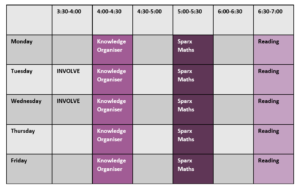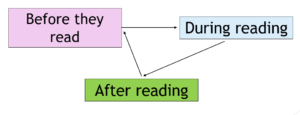Making the most of Reading during Home Learning
At TAL, all students are expected to read for 30 minutes every day. This is a simple, but powerful strategy that ensures our students will be successful. Our library is stocked full of fantastic books and we will help your child find one that they love!
Research clearly demonstrates the positive impact regular reading for pleasure has on a student’s life chances.
Evidence suggests that there is a positive relationship between reading frequency, reading enjoyment and attainment (Clark 2011; Clark and Douglas 2011).
Reading enjoyment has been reported as more important for children’s educational success than their family’s socio-economic status (OECD, 2002).
As a parent, however, it can be difficult to know how to best support your child with this. Below are some suggestions that will help ensure Reading for Home Learning is truly effective.
Tip 1: Have a timetable of when your child will read at home – and stick to it!

Tip 2: Be a good role model for your child – let them see you reading.
Tip 3: The seven questions to ask your child about what they are reading

Before reading:
- What do you think might happen in this story?
In general, try to keep your questions open-ended.
Ask: “What do you think this story is about?” rather than, “Do you think this story is about a superhero?” to develop more of a conversation.
During reading:
- What word do you think should come next?
Every so often, cover a word in a sentence and ask this question.
- What was that character’s name again?
Simple recall questions help you gauge your child’s reading comprehension. It’s common for a child to skim past words or names they’re not familiar with, but remembering these basic facts helps them to better answer more complex comprehension questions later on, and boosts attention and memory skills.
- Which words do you think best describe this character?
- Does anything in this book seem familiar to you?
You could also phrase this question as: “Can you make a connection between what’s happening in this book and something in your own life?”.
After Reading:
- How might this story be different if it was told from another character’s point of view?
This question encourages your child’s reasoning skills.
- Can you make up a different ending to this story?
Your child will need to reflect on the story to answer this question, and will also need to think comprehensively about the various routes the plot could have taken.

